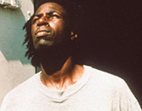|
|

|
 HIP-HOP
POLITICS: HIP-HOP
POLITICS: DECONSTRUCTING THE MYTH by Yvonne Bynoe http://www.urbanthinktank.org In the 1980s and early 1990s rap artists, like Public Enemy, KRS-One, X-Clan and Paris, reacting to the negative effects of the economic and political policies of the Reagan-Bush administrations, produced socially conscious songs like, "The Devil Made Me Do It."1 "Fight the Power"2 and "Who Protects Us from You;"3 such songs suggested the emergence of a hip-hop inspired political movement. Along with more serious lyrical content, these rap artists began trading in their enormous gold chains for African medallions and their designer clothing for unadorned, utilitarian wear. During this period, it was rap artists, rather than Black churches or traditional civil rights organizations, who through their music and personas connected with disenfranchised urban youth. The commercial success of "conscious" rap artists along with the laziness of mainstream media helped to spawn the raptivist. The raptivist is essentially a rap artist who dabbles in activism on the side. The media instead of identifying the emerging leadership of the post-civil rights generation simply deemed rap artists, the most visible young Blacks in society, as the new political spokesmen. In 1992, four white police officers were acquitted in the videotaped beating of Black motorist, Rodney King. In the days following the verdict, the Los Angeles riots ensued and journalists who wanted to tap into the thoughts of Black youth, did not go to young political leaders or social scientists, as they had in the 1960s and 70s, but to rap artists. West Coast rap artists like Ice Cube and Ice T in turn told the media that they had predicted years earlier on their records that continued police brutality in California would result in civil unrest. The presumption that rap music and hip-hop culture were turning political was further bolstered in June of 1992 when raptivist, Sister Souljah came to national attention. In the aftermath of the L.A. riots, President Bill Clinton chastised Sister Souljah, at a Rainbow Coalition function, in front of the Reverend Jesse Jackson, for a comment attributed to her advocating violence against whites. Traditionally, mainstream media portrayed the leadership of this generation as legacy children, known more for their famous last names than their accomplishments and wannabe activists who despite not having tangible agendas for Black empowerment or solid community support nonetheless looked good on camera. Therefore the defiant stance and outspoken language of this new breed of politically conscious rap artists, resurrected for many Blacks and whites, the voices of the political activists of the past. Less impressed observers, like social critic Adolph Reed Jr. however gauged this new group of performer/activists as politically naïve or worse, disingenuous, stating, "…Interviews raised the disturbing possibility that many of these "raptivists" the purportedly authentic voices of political astute youth, in their minds construe the scenes staged in their message videos as identical with actual political experience."4 While the 1960s and 1970s produced a cadre of activists and political agitators, whose activities reshaped America's dialogue on race, their progeny has been by comparison, silent. The ascent of raptivists in the media meant that the post-civil rights generation itself failed to recognize and put forth real political leaders, satisfying itself with the pseudo-political rhetoric of rap artists. The result is that the post-civil rights generation lacks gravitas and thus has failed to develop its own political agenda, much less a strategy to execute it. The chief problem with raptivists is that while socially conscious rap artists articulated the inequalities and discriminatory policies still targeted toward African-Americans and Latinos, these artists for the most part did not follow up their declarations with programs to facilitate substantive changes. The attempts that were made by artists to build vehicles for change were short-lived due to the artists' lack of organizing experience, political savvy and capital. The inability of insightful artists to organize a political movement underscores the contradiction of so-called hip-hop politics. While rap music and its related hip-hop culture may espouse political viewpoints, the bulk of its political activism is limited to artists lending their support and talents to a particular protest record and its accompanying video5 or a live performance6, rather than actual policy changing endeavors. Hip-Hop culture, as we currently know it, therefore cannot adequately foster a political movement. Hip-Hop is primarily a cultural expression that is formed from the shared attitudes, values, goals and practices of a subset of the African-American community. Politics is defined as the art or science concerned with guiding or influencing governmental policy. The two purposes seem to be mutually exclusive, because where hip-hop seeks to define a specific group reality within society, politics seeks to define society in general. In basic terms, raising awareness about police brutality through a song or performance is rap/hip-hop, but actually motivating the masses to force changes in police department procedures and/or the laws used to prosecute corrupt cops is politics. To paraphrase Public Enemy front man, Chuck D, we do not need hip-hop doctors or hip-hop politicians. The leadership to come from the post-civil rights generation must be able to do more than rhyme about problems, they have got to be able to build organizations as well as harness the necessary monetary resources and political power to do something about them. In this light, the post-civil rights leadership must understand and recognize the relevance of hip-hop culture, but more importantly, be conversant in the ways that government(s) run. In order to be effective, these new school leaders must not only be well versed on the issues, they must be able to formulate and pass policy. Harold Cruse in his seminal work "Crisis of the Negro Intellectual" advocates that true Black empowerment requires that economic, cultural and political goals be pursued simultaneously. "In short, Harlem [the symbolic center of Black America] exists for the benefit of others and has no cultural, political or economic autonomy. Hence, no social movement of a protest nature in Harlem can be successful or have any positive meaning unless it is at one and the same time a political, economic and cultural movement. A Harlem movement that is only political, or only economic or only cultural, or merely a protest movement-has to fail. It must be a combined movement…." The post-civil rights generation having birthed a cultural expression in hip-hop must now work on the second prong of the triumvirate, and structure a relevant political initiative, distinct from the underlying cultural idiom. Rap artist Too Short says, "[g]et in where you fit in…" meaning that people should contribute what they can, where it is needed. Moreover, Eric Hoffer in his book "True Believer" posits that there is a division between the purpose of men of words and that of men of action. According to Hoffer, the act of undermining existing institutions and familiarizing the masses with the idea of change can be done only by people who are recognized by the public as relevant talkers and writers. Hoffer states: "What the classification attempts to suggest is that readying the ground for a mass movement is done best by men whose chief claim to excellence is their skill in the use of the spoken or written word; that the hatching of an actual movement requires the temperament and that talents of the fanatic and that final consolidation of the movement is largely the work of practical men of action." Therefore while rap artists certainly have a role in the movement for racial equality, the work of defining and implementing a political agenda, should be left to post-civil rights generation activists, organizers and politicians. It is these people and not rap artists, who must work to affect legislative changes on issues such as: police brutality, attacks on affirmative action, environmental racism, educational equity and juvenile justice system abuses. With the arrival of a nascent class of millionaire rap artists and hip-hopreneurs, creative people can now expand their roles beyond pontificating to include financially supporting political and community efforts. It is time for the post-civil rights generation to return to the paradigm of artists sounding the clarion call for change while activists, organizers and politicians plan out the charge. In the 1960s and 70s, no one would have ever thought to ask James Brown, Harry Belafonte or Ossie Davis and Ruby Dee to lead a political movement; these artists and their peers supported the work of community activists and established political leaders. Today however rap artists have become de facto representatives for the post-civil rights generation, being asked to provide opinions and solutions to issues well beyond their realms of expertise. Furthermore, it is affront to numerous grassroots activists and politicians, diligently working in our communities, that rap artists, with no government or organizing experience, are now being seriously considered as viable candidates for political office. The cult of celebrity that permeates American society has helped the post-civil rights generation lose sight of its priorities, viewing politics through a pop culture lens. While it is true that a platinum selling rap artist could conceivably generate excitement among the hip-hop demographic, encouraging them to come out to the polls and vote, the more important question is what would the rap artist do it elected? White America saw fit to elect a former actor President and a former professional wrestler governor of Minnesota, but should African-Americans, whose status in this country remains so precarious, place their fates in the hands of political naïfs? Rap artists and other entertainers are not inherently unfit to become political leaders, but they cannot be both simultaneously. If a rap artist becomes an elected official or proclaims himself a leader, then he cannot subjugate the concerns and needs of his constituents to tour schedules or recording sessions. Like Sonny Bono, Fred Grandy, Fred Thompson, Jesse Ventura and Ronald Reagan, who all left the entertainment industry for politics, a rap artist would have to become an ex-rap artist before the post-civil rights generation should begin to take him seriously as a political entity. A rap artist who aspires to be community leader cannot lead a dual life, with new responsibilities comes the need to shed one persona for another. The electorate for instance would not be expected to call their representative, Congressman Ol' Dirty Bastard, similarly a "rap-politician" could not be in a nightclub with the requisite entourage on Saturday night and then be in his government office conducting the people's business on Monday. Political activism is a full-time, contact sport, necessitating players who are fully dedicated to learning the rules of the game, then playing to win. The challenge for post-civil rights generation leadership is to learn the lessons of the past and apply them to the realities of the present. Other ethnic group like the Irish and the Italians understood early on that in this country power is never relinquished voluntarily. These groups and their leadership used the existing political system to advance themselves through control of local economic resources i.e. jobs, municipal contracts, housing and the legislation that related to them. Although most African-Americans did not arrive to this nation as part of the regular immigration procedure, post-civil rights leaders must nevertheless use similar tactics to revitalize urban centers and to prepare people of color for the new, global, digital world. Moreover, while remaining committed to the traditional civil rights agenda, new leaders must be cognizant that with the increasing influence of new immigrant groups, the traditional white-black race dialectic is no longer feasible; inclusion must be viewed under a new prism. Interethnic group coalitions must be built where and when interests intersect, at the same time, new strategies must be developed to ensure that the government expands the proverbial pie instead of sacrificing African-Americans in order to provide opportunities for other ethnic groups. It is not too dramatic to recall that countless African-Americans gave up their lives, literally and figuratively, in order to have this country acknowledge us as full citizens. Continuing this farce called hip-hop politics does a disservice to the important work done by our elders and ancestors, as well as obscures the real work that this generation needs take on and move forward. The conditioning of instant gratification would make it seem reasonable for new school political operatives to think that rap artists could jettison the tedious work of organizing, lobbying, fundraising and campaigning, however nothing solid can be built on a weak foundation. It is therefore imperative that the post-civil rights generation realizes that true equality will only be gained and sustained through hard work, focused dedication and training. Like dynamite, rap artists can set off an explosion, but only rumble will result without skilled architects to design the desired structure and skilled contractors to actually build the edifice. |
